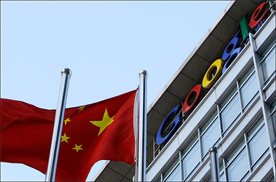
谷歌(Google)正在逼中国亮出底牌。这家在线搜索巨擘宣布,自己“不再愿意”审查其中文网站上的搜索结果。目前,它将就以何种标准“在法律允许的范围之内运营一个内容不经过滤的搜索引擎”,与中国政府谈判。这是一种大胆的表态,很有可能导致谷歌被赶出这个重要的新兴市场。
中国仍然是一个穷国,但跨国企业都希望在这个拥有13亿日渐富足的消费者的市场站稳脚跟。迄今为止,这个大陆经济体的威权统治者们一直能够强迫新闻、媒体、在线搜索及软件公司遵从其繁琐的审查规定。
微软(Microsoft)和雅虎(Yahoo)的中文搜索网站也在遵守这些规定。自2006年起,谷歌也开始低头,不过,它会向用户提供更多细节,说明信息是在何时被屏蔽掉的。谷歌服从这种限令的决定不仅在其内部引起分歧,也一直是世人激烈争论的焦点。
对此持异议的包括公司联合创始人谢尔盖•布林(Sergey Brin)。反对者担心,遵守中国法律,直接违反了公司的使命——“整合全球信息,使人人皆可访问并从中受益”。此外,与中国审查机构合作,是导致谷歌健康形象受损的主要因素。
因此,这次谷歌看上去又酷了起来。但这种姿态并不是公关噱头,否则风险也太高了,会威胁到它在这个网民人数已超过3亿的国家的业务。倒不如说,对精于算计、无法容忍其舆论控制权遭到挑战的中国政府,这是谷歌作出的回应。
去年,乌鲁木齐骚乱和天安门事件20周年纪念活动都遭到了中国政府的强硬镇压。Facebook和Twitter被封。控制成性的官员们甚至对儿童讽刺作品和笑话都加以查禁。此外,谷歌最近发现,有来自中国的黑客入侵其电子邮件服务系统。这些事件打破了公司内部不同意见之间的平衡,最终导致了本周的决定。
如果谷歌能够坚持自己的声明,纵使被逐出中国,它的立场仍然意义重大。今后,中国政府扼杀自由言论会变得更难。谷歌是第一家坚定地抗拒中国言论控制的大公司。让我们祈祷它不是最后一家。
译者/何黎
http://www.ftchinese.com/story/001030810

Google is calling China's bluff. The online search giant has announced that it is “no longer willing” to censor results on its Chinese site. It will now talk with the Beijing government about the basis on which it would be possible to run “an unfiltered search engine within the law, if at all”. This is a bold stand, and could well lead to Google being barred from an important emerging marketplace
China is still a poor country, but multinational companies want to establish themselves in a market of 1.3bn increasingly prosperous people. The authoritarian rulers of this continental economy have, until now, been able to force news, media, online search and software companies to comply with their onerous censorship requirements.
Microsoft and Yahoo both run local search sites that conform to these rules. Since 2006, so has Google, although in a form that gives users more details about when information is being kept from them. The decision to go along with the restrictions has been the subject of fierce debate, not least within Google itself.
The sceptics included Sergey Brin, one of the company's founders. They fretted that complying with China's laws directly breached the company's mission: “to organise the world's information and make it universally accessible and useful”. Collaboration with the censors, moreover, was the main factor that drew clouds over Google's sunny image.
So, today, Google looks cool again. But this posture is not a PR stunt. If it were, it would be an extraordinarily high-risk one. Its presence in a country that already has more than 300m of its people online is at stake. Rather, Google is reacting to a calculating Chinese state that will brook no challenge to its control of propaganda.
Last year the unrest in Urumqi and the anniversary of the Tiananmen Square massacre both provoked frenzied crackdowns. Facebook and Twitter have already been blocked. Control-obsessed officials have suppressed even childish satire and jokes. In addition, Google recently uncovered attacks on its e-mail service from within China. These incidents changed the balance of opinions within the company, leading to this week's decision.
If Google follows through on its statement, even if it is forced out of China, its stand will still matter. In future the Chinese will have more difficulty snuffing out free expression. Google is the first major company to steadfastly refuse China's demands for control. Let us hope it is not the last.

没有评论:
发表评论